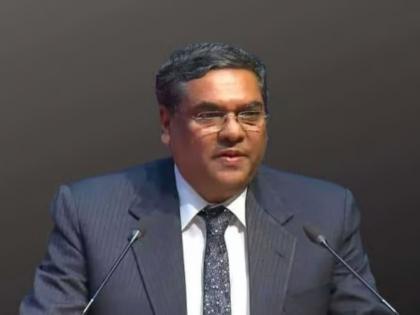Justice Sanjiv Khanna, Meet Next Chief Justice of India, With Effect from November 11
By Lokmat English Desk | Updated: November 10, 2024 09:27 IST2024-11-10T09:20:54+5:302024-11-10T09:27:25+5:30
Chandrachud former Chief Justic of India retired from his post on November 8. Officially his tenure as the Chief Justice ...

Justice Sanjiv Khanna, Meet Next Chief Justice of India, With Effect from November 11
Chandrachud former Chief Justic of India retired from his post on November 8. Officially his tenure as the Chief Justice of India was set to end on November 10, but since the Supreme Court is on holiday on November 9. Post his final day Supreme court's senior most judge Justice Sanjiv Khanna is going to be new CJI with effect from November 11, 2024.
Justice Khanna’s hands will be full of day one of his tenure as Chief Justice of India (CJI), which is set to conclude on May 13, 2025. With a focus on diversifying the Collegium’s picks for high courts and the Supreme Court, he will also tackle critical issues like reducing the backlog of cases and addressing institutional concerns about case allocation. His tenure is expected to emphasize the swift disposal of cases, particularly those involving personal liberty. Born in 1960 into a prominent legal family, Justice Khanna’s journey to the highest court of the land is a long and distinguished one. He began his legal career in 1983 after enrolling with the Bar Council of Delhi, following a law degree from Delhi University’s Campus Law Centre. Despite his parents’ wish for him to pursue a career as a chartered accountant, Justice Khanna chose law, a decision that would eventually cement his place in Indian legal history.
He is the nephew of Justice Hans Raj Khanna, a revered figure in Indian jurisprudence, who resigned from the Supreme Court in 1976 after being superseded for the position of Chief Justice of India by then-Prime Minister Indira Gandhi. Justice Hans Raj Khanna’s resignation followed his dissenting opinion in the landmark ADM Jabalpur Vs Shiv Kant Shukla case, which dealt with the suspension of habeas corpus during the Emergency. Justice Khanna’s father, Dev Raj Khanna, was a judge of the Delhi High Court, and his mother, Saroj Khanna, was a Hindi lecturer at Lady Shri Ram College in Delhi. Raised in an intellectually stimulating environment, Justice Khanna attended Modern School, Barakhamba Road, and later graduated from St Stephen’s College.
Also Read: CJI DY Chandrachud’s Last Working Day: Bows to Colleagues, Apologizes for Any Hurt (Watch Video)
He honed his legal expertise in the Delhi High Court, practicing in areas such as constitutional law, commercial law, direct taxation, environmental law, and medical negligence. Justice Khanna also had a distinguished career as a government counsel, serving as senior standing counsel for the Income Tax Department and later as Standing Counsel for the National Capital Territory of Delhi. In 2005, he was appointed as an additional judge of the Delhi High Court and became a permanent judge in 2006. Known for his conservative approach, Justice Khanna’s colleagues often joked about his restraint in granting relief. However, since his elevation to the Supreme Court in January 2019, he has gained a reputation for being more inclined toward granting relief, particularly in cases involving personal liberty.
Justice Khanna was elevated to the Supreme Court by the Collegium, despite being ranked 33rd in the all-India seniority list of high court judges. His selection was seen as a significant step in diversifying the Supreme Court’s composition. Lawyers cite his sensitivity to personal liberty as a hallmark of his judicial career. Senior advocate Sidharth Luthra praised Justice Khanna’s leadership in the courtroom, noting his firm command, quick wit, and ability to ensure a positive experience for both litigants and lawyers. "His work ethic and dedication to the law were clear from his days as a lawyer, and his meticulousness and openness as a judge have earned him great respect," Luthra said.
Justice Khanna remains reserved and avoids the limelight, preferring to focus on his work. Colleagues describe him as affable and calm, with a deep commitment to legal education and supporting institutions of higher learning. Throughout his career, Justice Khanna has delivered several landmark judgments, including rulings on the applicability of the Right to Information Act to the Chief Justice of India’s office, the unconstitutionality of the Electoral Bond Scheme, and key decisions concerning Article 370 and the use of Electronic Voting Machines.
As his brief tenure as CJI unfolds, legal experts expect Justice Khanna to implement innovative measures to enhance the functioning of the Supreme Court and address the concerns of the legal community. Advocate Vipin Nair, president of the Supreme Court Advocates-on-Record Association, called his elevation the culmination of a career marked by "balanced jurisprudence and unwavering commitment to constitutional values."
Open in app